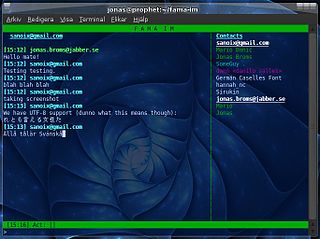See also
- Farstream (formerly Farsight)
Telepathy is a software framework which can be used to make software for interpersonal communications such as instant messaging, Voice over IP or videoconferencing. Telepathy enables the creation of communications applications using components via the D-Bus inter-process communication mechanism. Through this it aims to simplify development of communications applications and promote code reuse within the free software and open source communities by defining a logical boundary between the applications and underlying network protocols.
There are free software implementations of various protocols that export Telepathy interfaces:
Mission Control is the name of the component that provides a way for end-user applications to abstract some details of low level telepathy components such as connection managers. [2]
Tubes are Telepathy's mechanism for supporting arbitrary data transfer and remote IPC. [3]
Telepathy forms the basis of the instant messaging and voice/video calling software on the Nokia 770, N800, N810, N900, N9 and Jolla.
Protocol implementations provide a D-Bus service called a connection manager. Telepathy clients use these to create connections to services. Once a connection is established, further communication happens using objects called channels which are requested from the connection. A channel might be used to send and receive text messages, or represent the contact list, or to establish a VoIP call.
The Session Initiation Protocol (SIP) is a signaling protocol used for initiating, maintaining, and terminating communication sessions that include voice, video and messaging applications. SIP is a signaling protocol used in Internet telephony, in private IP telephone systems, as well as mobile phone calling over LTE (VoLTE).

Pidgin is a free and open-source multi-platform instant messaging client, based on a library named libpurple that has support for many instant messaging protocols, allowing the user to simultaneously log in to various services from a single application, with a single interface for both popular and obsolete protocols, thus avoiding the hassle of having to deal with a new software for each device and protocol.

Extensible Messaging and Presence Protocol is an open communication protocol designed for instant messaging (IM), presence information, and contact list maintenance. Based on XML, it enables the near-real-time exchange of structured data between two or more network entities. Designed to be extensible, the protocol offers a multitude of applications beyond traditional IM in the broader realm of message-oriented middleware, including signalling for VoIP, video, file transfer, gaming and other uses.
Kopete is a multi-protocol, free software instant messaging client released as part of the KDE Software Compilation. Although it can run in numerous environments, it was designed for and integrates with the KDE Plasma Workspaces. Kopete was started because ICQ blocked Licq from their network in 2001. According to the original author, Duncan Mac-Vicar Prett, the name comes from the Chilean Spanish word copete, meaning "a drink with your friends". Kopete has been nominated for multiple awards. The designated successor is KDE Telepathy from the KDE RTCC Initiative.
Creation
Message-oriented middleware (MOM) is software or hardware infrastructure supporting sending and receiving messages between distributed systems. MOM allows application modules to be distributed over heterogeneous platforms and reduces the complexity of developing applications that span multiple operating systems and network protocols. The middleware creates a distributed communications layer that insulates the application developer from the details of the various operating systems and network interfaces. APIs that extend across diverse platforms and networks are typically provided by MOM.
In computer and telecommunications networks, presence information is a status indicator that conveys ability and willingness of a potential communication partner—for example a user—to communicate. A user's client provides presence information via a network connection to a presence service, which is stored in what constitutes his personal availability record and can be made available for distribution to other users to convey their availability for communication. Presence information has wide application in many communication services and is one of the innovations driving the popularity of instant messaging or recent implementations of voice over IP clients.
HCL Sametime Premium is a client–server application and middleware platform that provides real-time, unified communications and collaboration for enterprises. Those capabilities include presence information, enterprise instant messaging, web conferencing, community collaboration, and telephony capabilities and integration. Currently it is developed and sold by HCL Software, a division of Indian company HCL Technologies, until 2019 by the Lotus Software division of IBM.

Google Talk was an instant messaging service that provided both text and voice communication. The instant messaging service was variously referred to colloquially as Gchat, Gtalk, or Gmessage among its users.

Skype for Business Server is real-time communications server software that provides the infrastructure for enterprise instant messaging, presence, VoIP, ad hoc and structured conferences and PSTN connectivity through a third-party gateway or SIP trunk. These features are available within an organization, between organizations and with external users on the public internet or standard phones.

Skype for Business was an enterprise software application for instant messaging and videotelephony developed by Microsoft as part of the Microsoft Office suite. It is designed for use with the on-premises Skype for Business Server software, and a software as a service version offered as part of Office 365. It supports text, audio, and video chat, and integrates with Microsoft Office components such as Exchange and SharePoint.

Jingle is an extension to the Extensible Messaging and Presence Protocol (XMPP) which adds peer-to-peer (P2P) session control (signaling) for multimedia interactions such as in Voice over IP (VoIP) or videoconferencing communications. It was designed by Google and the XMPP Standards Foundation. The multimedia streams are delivered using the Real-time Transport Protocol (RTP). If needed, NAT traversal is assisted using Interactive Connectivity Establishment (ICE).
Farstream is an audio/video conferencing framework based on GStreamer. The project provides audio/video conferencing for as many instant messengers as possible through a modular design. Telepathy and Farsight constitute the first implementation of the Jingle XMPP protocol.

Empathy is an instant messaging (IM) and voice over IP (VoIP) client which supports text, voice, video, file transfers, and inter-application communication over various IM communication protocols.

Fama IM is a free software instant messaging client for Linux and Unix that supports the use of multiple instant messaging protocols.

Jami is a SIP-compatible distributed peer-to-peer softphone and SIP-based instant messenger for Linux, Microsoft Windows, OS X, iOS, and Android. Jami was developed and maintained by the Canadian company Savoir-faire Linux, and with the help of a global community of users and contributors, Jami positions itself as a potential free Skype replacement.

KDE Telepathy is an instant messaging (IM) and voice over IP (VoIP) client which supports text, voice, video, file transfers, and inter-application communication over various IM protocols. It uses the Telepathy framework as its back-end. It is the slated replacement for Kopete, and its main focus is the integration between different components of the KDE Software Compilation that may benefit from real-time communication and collaboration features.

Tox is a peer-to-peer instant-messaging and video-calling protocol that offers end-to-end encryption. The stated goal of the project is to provide secure yet easily accessible communication for everyone. A reference implementation of the protocol is published as free and open-source software under the terms of the GNU GPL-3.0-or-later.

Movim is a distributed social network built on top of XMPP, a popular open standards communication protocol. Movim is a free and open source software licensed under the AGPL-3.0-or-later license. It can be accessed using existing XMPP clients and Jabber accounts.